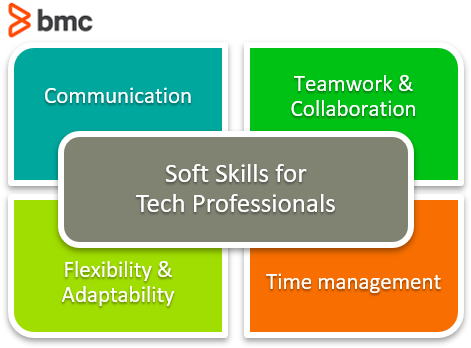As technology is increasingly intertwined with every area of business, tech professionals need to consider what skills will help them to be the best at their jobs. Of course, having the technical know-how to get the job done is important, but as IT professionals expand their responsibilities and engage with various departments and both internal and external stakeholders, hiring managers look at more than just a candidate’s technical prowess.
Let’s look at the top soft skills tech professionals need to have to excel at their jobs and maximize career potential.
What are soft skills?
The technical know-how is important to be competent in your field. Those technical skills and knowledge can be learned. Unlike hard skills, which showcase knowledge acquired through training and experience, soft skills refer to traits and habits that inform how one works, both on their own and with others. This includes:
- Personality traits
- Work ethic
- Interpersonal skills
Possessing, and using, the right soft skills can directly affect how you are treated in the workplace and how likely you are to receive recognition or a promotion. Some soft skills are more inherent and are programmed into our personalities. Luckily for all of us, it is possible to make improvements in these areas, even if certain soft skills do not come naturally.
Top soft skills for tech employees
The following four soft skills are some of the most important for an IT professional.

Communication
Communication skills are the bread and butter of many industries. It is no different for those working in technology. Especially now that tech professionals are working together with colleagues from various departments, listening, speaking, and writing skills are vital to success.
Professionals who work in a support capacity, like on a service desk, must be able to adjust their tone, vocabulary, and methodology to their audience. In the same day, you might be working with someone who is tech savvy followed by someone less familiar with technology. A good communicator will be able to break down complex issues and be able to explain them in terms laypeople will understand.
Supervisors and executives will need to have the capability to explain not only how something works, but also to explain why. Those in higher-level positions may have to convey to those in charge why their particular project should receive funding. The best way to get executives and stakeholders on board with an idea is to successfully communicate why it is valuable to the business. It is imperative that someone working in tech has the ability to both understand and relay complex ideas.
Even if you are not a natural communicator, there are steps you can take to improve your communication skills. The goal is to be able to actually hear the needs of people, fully understand, be able to come up with a solution, and then describe the merits of that solution to those in power.
Teamwork and collaboration
A traditional stereotype of someone working in technology was a lone wolf: logging in and clocking hours from your remote location, often at whatever odd hours work best for you. That is no longer the case.
It is now widely understood that building tech as a team, besides being more enjoyable, often leads to better products. Technology leaders recognize this and are more likely to hire someone who can integrate well with their team. It is important that team members be able to give and gracefully receive feedback, as well as collaborate with colleagues who may have different perspectives. Being adept at these things leads to greater efficiency for the whole team.
While tech positions require more collaboration, it is still true that a large number of IT professionals work remotely. In these instances, the ability to effectively collaborate and come together as a team is even more important, as most meetings will be handled virtually. It is incredibly valuable to have someone who is able to adequately use technology to connect and maintain that open dialog. Additionally, someone with the ability to discern when to take the lead on a project or step back and take direction, depending on what is required, will prove themselves to be an indispensible asset.
In addition to the ability to work collaboratively within one’s own department, it is vital that a tech professional be able to utilize these skills to collaborate across the organization. Now more than ever, those in IT are vital to the running of a successful business.
Flexibility and adaptability
Part of being an asset to any team is the ability to handle setbacks or unexpected challenges with grace. Working in technology requires the capability to accept and adapt to changes in order to keep up with a market that is continually growing and evolving. Examples of this flexibility and adaptability:
- Showing resilience
- Thinking quickly
- Anticipating new developments or needs
- Bouncing back from any unforeseen delays or developments
Similarly, an employee who is open to feedback and willing to implement any necessary changes is vastly more valuable to the organization than someone who digs in their heels when challenged. This is true no matter your specific role, as both employers and customers or clients will appreciate working with someone who commits to being flexible.
Time management
Being able to manage one’s time is a key part of being both an autonomous adult and a successful professional. Missing a deadline can affect the whole team and push back a whole project, which can have a ripple effect across an organization.
The IT department is simultaneously dealing with business development, product development, maintenance, customer service, and solving problems companywide. In order to excel, one needs to be able to adequately manage regular day-to-day duties while also being prepared for the unexpected: whether a system crashes, an error is made, or hardware malfunctions.
As the IT department is integrated throughout an organization, it therefore has influence over how the company performs. A tightly run and efficient tech operation will lead to success for the whole business. Thus, a tech professional who has a solid handle on time management will become a much more valuable employee and colleague. An efficient and reliable person will be given more responsibility, leave a favorable impression among colleagues, and eventually become indispensible.
If your time management skills are not where you want them to be, here are some concrete steps you can take to improve.
The value of soft skills
Employees who exhibit a strong hold on soft skills can prove themselves to be even more valuable than those with specific experience or training in hard skills. In a field such as technology, the actual processes and protocols are constantly evolving.
If you’re a team player who can effectively communicate, manage your time, and adapt to new challenges, you’ll become an essential member of your team—and you’ll also stand out for future opportunities.
Additional resources
For more on tech staffing and skills, browse our BMC Business of IT Blog and check out these articles:







